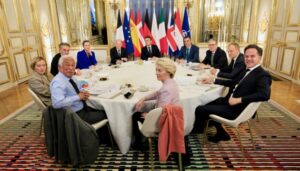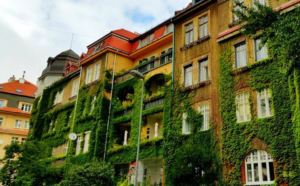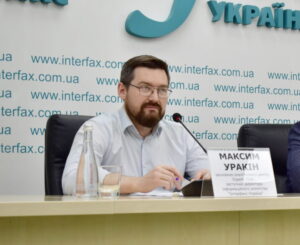
Fixygen has prepared an analytical report with a forecast for the cryptocurrency market for September 2025:
The overall market picture as of September 1 is as follows:
A number of risks to the market must also be taken into account. Let’s start with the fact that September is traditionally the worst month for crypto; historical data shows significant market declines during this month. Macro risks should also be kept in mind: high Fed rates and uncertain regulatory decisions may put pressure on the market, while the illusion of a bullish rally (FOMO) may lead to overheating and irrational decisions.
Therefore, Fixygen offers three main market development scenarios.
Scenario A: “Red September” (probable, baseline)
Scenario B: “Moderate Recovery”
Source: https://www.fixygen.ua/news/20250902/prognoz-rinku-kriptovalyut-na-veresen-vid-fixygen.html

Discussions on the Ukrainian settlement between a number of European leaders are scheduled for Thursday in France, the Financial Times (FT) reported on Sunday.
“Those who previously met with (US President Donald) Trump in Washington are expected to gather in Paris on Thursday at the invitation of French President Emmanuel Macron to continue high-level discussions,” the publication writes, citing diplomatic sources.
“Among those present will be German Chancellor Friedrich Merz, British Prime Minister Keir Starmer, NATO Secretary General Mark Rutte, and European Commission President Ursula von der Leyen,” the FT notes.
No official announcement has been made about this meeting yet. The meeting is expected to be a continuation of discussions on security guarantees that the US and EU countries could provide to Ukraine after the war ends. These include the deployment of several tens of thousands of European troops in the country, according to the article.
In turn, in an interview with the FT, von der Leyen said that Europe is working on a plan to “deploy multinational forces with American support.”
“President Trump has assured us that American support will be part of the guarantees. He has repeatedly and clearly confirmed this,” she said.

The Relocation.com.ua project has prepared a fresh overview of the Slovak housing market (in the first half of 2025) in three sections — prices/sales, rentals, and construction:
Prices and sales continued to grow. In Q2 2025, the average price of residential real estate in Slovakia rose to €2,777/m², which is +12.8% y/y (and +2.9% compared to Q1). This is a new historical maximum according to NBS data. In Q1, the figure was €2,700/m² (+11.4% y/y). Growth is synchronous for apartments and houses, faster in large cities and regional centers.
The capital has seen a sustained upturn: according to media market data, in Q2, the average price of apartments approached €3,100/m², exceeding the peak of 2022 (the old housing stock is growing faster than new construction).
After a weak Q1 (due to the effect of the VAT increase from 20% to 23% from 2025), Q2’25 in Bratislava showed a sharp rebound — ~797 new buildings sold, which is +60% q/q and the second-best result in four years. For the whole of 2024, sales of new buildings in the capital doubled (1,664 vs. 773 in 2023) — part of the demand was “carried over” due to VAT.
The cost of local mortgages continues to normalize: the average rate for residential loans with a 5–10-year fixed term in June was ~3.0%, which supports solvent demand.
The rental market in 2025 is “cooler” than the price market. The supply of apartments for rent has increased, and average rates in a number of regions have been adjusted downward. At the same time, Bratislava remains the most expensive: the average rent is ~€890/month; the most affordable region among the large ones is Trenčín (~€544/month). There is a significant spread across the capital’s districts.
The gross rental yield in the country is about 4.9% (Q2’25); a year ago it was ~5.3%: profitability is slightly “eaten away” by the outpacing growth in purchase prices.
Housing construction is slowing down: in Q1 2025, 3,119 apartments/houses were completed — the lowest number in 9 years, −24% y/y (data from the State Statistics Office). This is the result of a weak flow of starts in 2023–2024 against the backdrop of expensive money and regulatory uncertainty.
It should also be noted that on April 1, 2025, a new Construction Law came into force, combining zoning and permitting into a single procedure designed to speed up the issuance of permits and reduce bureaucracy. The effect on the statistics of permits and completions will gradually become apparent in the second half of 2025–2026.
By mid-2025, Slovakia will be a “seller’s market” in terms of prices and a “tenant’s market” in terms of rents: prices will reach new highs amid cheaper mortgages and limited completions, while rents will stabilize due to increased supply.
If current trends continue, annual price growth is likely to slow down by the end of the year, but levels will remain high and housing supply will remain below pre-crisis levels.

This article presents key macroeconomic indicators for Ukraine and the global economy as of the end of April 2025.
The analysis is based on current data from the State Statistics Service of Ukraine (SSSU), the National Bank of Ukraine (NBU), the International Monetary Fund (IMF), the World Bank, and leading national statistical agencies (Eurostat, BEA, NBS, ONS, TurkStat, IBGE).
Maksim Urakin, Director of Marketing and Development at Interfax-Ukraine, Candidate of Economic Sciences and founder of the Experts Club information and analytical center, presented an overview of current macroeconomic trends.
Macroeconomic indicators of Ukraine
The first four months of 2025 were marked by weak but still positive economic growth for Ukraine. According to the NBU’s estimates, real GDP grew by about +0.5% year-on-year, and the State Statistics Service’s preliminary calculations later revised the dynamics to about +0.9% year-on-year and approximately +0.7% quarter-on-quarter. In the context of full-scale war, constant threats to infrastructure and logistics, a shortage of long-term capital, and limited investment programs, this primarily means maintaining the functionality of the economic system.
“Half a percent or even a percent of growth is not about acceleration, but about endurance. We are seeing a revival of domestic demand in trade, logistics, and certain high-tech niches. But this is essentially a recovery “on the spot”: without a massive investment impulse, without an expansion of value-added exports, without accessible long-term resources, banks and businesses will not be able to scale up. We need to move from survival to development — through investment, industrial projects, and an export ecosystem,” emphasizes Maksim Urakin.
Inflationary pressure is slowly easing. Annual inflation in April was estimated at around 13.1% y/y after 14.6% in March; the National Bank kept its key rate at 15.5%, combining inflation targeting with currency market stabilization.
“Monetary policy in 2025 is about balance. If we tighten too much, we will stifle business activity and lending; if we loosen too much, we will get a new wave of inflation and pressure on the exchange rate. The NBU’s task is not simply to “hold” the rate, but to synchronize with fiscal policy, IMF programs, and the pace of external revenues so that every hryvnia of reserves works toward recovery rather than plugging operational holes,” the expert notes.
Foreign trade remains a weak link. In January–April 2025, exports of goods were estimated at about $13.31 billion, imports at about $24.82 billion, and the negative balance at about $11.51 billion. Structurally, imports are made up of energy carriers, equipment, transport, and chemicals, while exports continue to depend on raw materials and semi-finished products.
“This is not a situational but a structural deficit. As long as we import energy-intensive goods and technological components and export raw materials, the risk to the balance of payments will not disappear. The solution lies in creating production chains within the country, localizing components, advancing the development of logistics and port infrastructure, insuring military risks, and insuring export credits. We need a policy of export industrial transformation, not just “VAT refunds,” emphasizes Maksim Urakin.
International reserves remain a positive buffer, reaching a historic high of about $46.7 billion on May 1, 2025. The growth was ensured by inflows from partners and a reduction in net interventions by the NBU.
“Reserves of over $40 billion are a safety net, but they are not the country’s wealth. Reserves are a credit of trust that must be converted into industrial modernization. If we dissolve this resource in consumption and imports, it will run out, and structural problems will remain. If we direct it towards financing exports, investment insurance, infrastructure, and technology, we will get a multiplier and productivity growth,” the economist emphasizes.
The debt burden also remains high: the total public and guaranteed debt as of April 30, 2025, was estimated at about UAH 7.48 trillion (equivalent to almost $180 billion). This supports budget stability “here and now,” but makes coordination with international programs, debt restructuring, and the launch of projects that generate foreign exchange earnings critically important.
“Debt is not the enemy when it works for development. Our test of maturity is to convert debt resources into productive investments rather than consumption. We need transparent project pipelines: from feasibility studies to long-term money under state guarantees, from export insurance to industrial parks and clusters. This is the only way we will break the inertia of import dependence,” concludes the founder of Experts Club.
Global economy
At the start of the second quarter of 2025, the world is moving in a mode of moderate growth with increased uncertainty. In its April WEO, the IMF estimated global GDP growth in 2025 at around 2.8% with inflation slowly subsiding but uneven demand geography. In the US, real GDP in the first quarter, based on annualized methodology, declined by approximately 0.3% q/q due to “re-imports” and weaker government spending, while core PCE inflation in April remained at around 2.2% y/y, allowing the Fed to maintain a cautious stance.
China maintained around +5.3% y/y in the first quarter, but weakness in real estate and consumer caution limit the prospects for acceleration.
The eurozone, according to preliminary estimates at the end of April, added around +0.4% q/q (+1.2% y/y), and the EU around +0.3% q/q, showing the first signs of emerging from prolonged stagnation. The UK was a positive exception among the G7, with approximately +0.7% q/q in the first quarter. Turkey reported strong growth of around +7.4% y/y amid extremely high inflation of around 70% y/y in April, forcing the central bank to maintain a tight policy. India remains the leader among the major economies with around +7.4% y/y at the beginning of the year, with moderate CPI inflation of around 3.3% in April.
Brazil posted around +0.8% q/q (+2.6% y/y) in the first quarter, but IPCA inflation rose to around 5.5% y/y, limiting the scope for rapid policy easing.
The global picture is a mosaic of different speeds and different risks. The US is technically having a weak quarter, but domestic demand is still holding up; Europe is showing a smooth recovery without a breakthrough; China is on track for growth but needs a new model of domestic demand; India is the flagship of dynamism and innovation; Turkey has paid for its momentum with inflation; Latin America is balancing between regulation and stimulation. For Ukraine, it is not only the figures of its partners that are important, but also their policies: where they buy more steel and food, where they build logistics and energy infrastructure, where opportunities open up for suppliers of engineering products. Our task is to predict not past but future demand and occupy a niche before someone else does. This means export risk insurance, fast customs corridors, long-term money for modernization, cluster specialization, and, most importantly, discipline in execution. Without this, we will remain a country of imports and large reserves that are melting away. With this, we can become a country of exports and large projects that work,” summarizes Maksim Urakin.
Key conclusions
In summary, at the beginning of the second quarter, the Ukrainian economy is in a phase of sustained equilibrium: modest growth, slowing inflation, and record reserves are counterbalanced by a deep trade gap and high debt burden. The solution lies in accelerating structural changes: investment in industry and logistics, high value-added exports, coordination with international programs, and transforming debt resources into a driver of productivity. As Maksim Urakin emphasizes, “the window of opportunity for transformation is already open — the only question is whether we will be able to pass through it quickly enough.”
Source: https://interfax.com.ua/news/projects/1101077.html

Gold traded at a four-month high on Monday amid growing demand for safe-haven assets and uncertainty surrounding US monetary policy.
The price of gold on the spot market rose 0.9% to $3,475.94 per ounce, its highest level since April 22. December futures for the precious metal on Comex rose 0.8% to $3,542.6 per ounce, according to trading data.
Analysts attribute the rise in gold prices to investor concerns about the independence of the Federal Reserve (Fed), uncertainty over US tariffs, and the upcoming release of the August US employment report.

The price of silver rose to its highest level in 14 years on Monday due to growing interest in safe assets. On the spot market, the price of silver increased by 2.4% to $40.61 per ounce, the highest since September 2011.
Experts note that demand for silver and other precious metals is being supported by uncertainty surrounding US trade policy and expectations for the release of a labor market report that could influence the Fed’s future interest rate decisions.